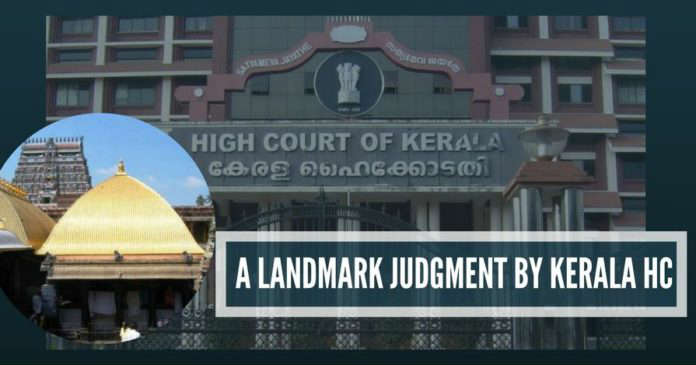Temples in Kerala have been the Kamadhenus or Holy Cows of political parties in the State

Even as the Kerala Government is trying to take full control of all Hindu temples in the State and bring them under the direct management of the CPI (M), the Kerala High Court on Monday delivered a lethal blow to the State Government as well as the CPI(M).
A bench of Justices P R Ramachandra Menon and Devan Ramachandran said in a landmark judgment on Monday that the appointments to Devaswam Boards in Kerala, which control, administer and rule the temples, are riddled with secrecy and the Government has to change it with immediate effect.
T G Mohan Das, Kerala president, Virat Hindustan Sangam, who is also the petitioner, in this case, told Team PGurus that if the Government implements the recommendations of the High Court, it is sure that the temples would come out of Government control. Das, described as a one-man army waging an intellectual, cultural and political battle against the Lefts and other religious fundamentalists in the State has been waging this legal battle since 2015.
When the Court asked the Government of Kerala how the appointments to the Devaswam Boards were being made, the government did not have a proper and convincing reply which spilled the beans. It may be noted that T Rajesh, a CPI(M) MLA, and a known Hindu baiter had introduced a private member’s bill in the legislative assembly to take over the entire Hindu temples in the State.
Temples in Kerala have been the Kamadhenus or Holy Cows of political parties in the State. Though the Devaswam Boards in the State which administer the temples should have believers as their members the Communists pack them with their own nominees, mostly non-believers. Recently, the Travancore Devaswam Board wound up a vegetarian canteen in the premises of Raja Rajeswari Temple at Thiruvananthapuram and launched an exclusive non-vegetarian restaurant selling beef. The TDB is headed by Padmakumar, an acolyte of chief minister Pinarayi Vijayan.
Lord Ayyappa Temple at Sabarimala is administered by TDB. But the temple or the Devaswam Board do not maintain a book of account and the public is in the dark about the goings-on in the temple and on the board. The post of a peon in TDB commands a premium of Rs 5,00,000. It is an open secret that the post of the chief priest of Sabarimala is auctioned to the highest bidder. Along with the TDB, the members of the Thazhaman Family, the traditional priests (Thanthri) of the temple are having a free run in the affairs of the temple. Mohanaru, the elder son of the Thanthri, was caught red-handed while he was performing “Pooja” with a notorious woman in an Ernakulam apartment.
The appointment of the chief priest of Sabarimala Temple is for one year and the going rate for the post varies between Rs 50 lakhs to Rs one crore, according to a seasoned priest in Ernakulam. “I applied a couple of times but the amount they ask for is beyond my capacity,” said the Namboodiri who belongs to a well known Illam in Kerala.,
The Kerala Government has made it mandatory for the TDB to deposit a major chunk of the annual income of Sabarimala Temple in the Government account in the state treasury and nationalized banks. No question is asked about how the money is spent by the government though there are reports that the money is transferred to some of the church and mosque accounts.
The copy of Monday’s judgment is yet to be uploaded in the Kerala High Court website due to server error. As and when the verdict copy is uploaded we will bring it to the notice of respected readers.
It may be remembered that Madras High Court in a recent order has asked the Tamil Nadu Government to furnish the details of 50,000 acres of prime land which disappeared from the temple properties which come under the Hindu Religious and Charitable Endowment Department.
Justice R Mahadevan of the Madurai Bench of the Madras High Court accepted the contention of a devotee who proved with statistics and details extracted through Right to Information Act that 40 years ago, temples and related religious institutions in the State-owned 5.25 lakh acres of agricultural land which has come down to 4.78 lakh acres by 2017.
The justice ordered the Hindu Religious and Charitable Endowments Department to initiate urgent measures to retrieve the 50,000 acres of prime property and report back to the Court about the action taken. Temple worshippers allege that the Dravidian governments which ruled the State during the last five decades disposed off these prime lands to their relations and associates and for gratification.
If these verdicts are read together with the Supreme Court verdict on the Chidambaram Temple administration in Tamil Nadu, the day is not far off when all temples in the country would be freed from the shackles of the governments.
Click here to read the judgment
Source : PGurus




